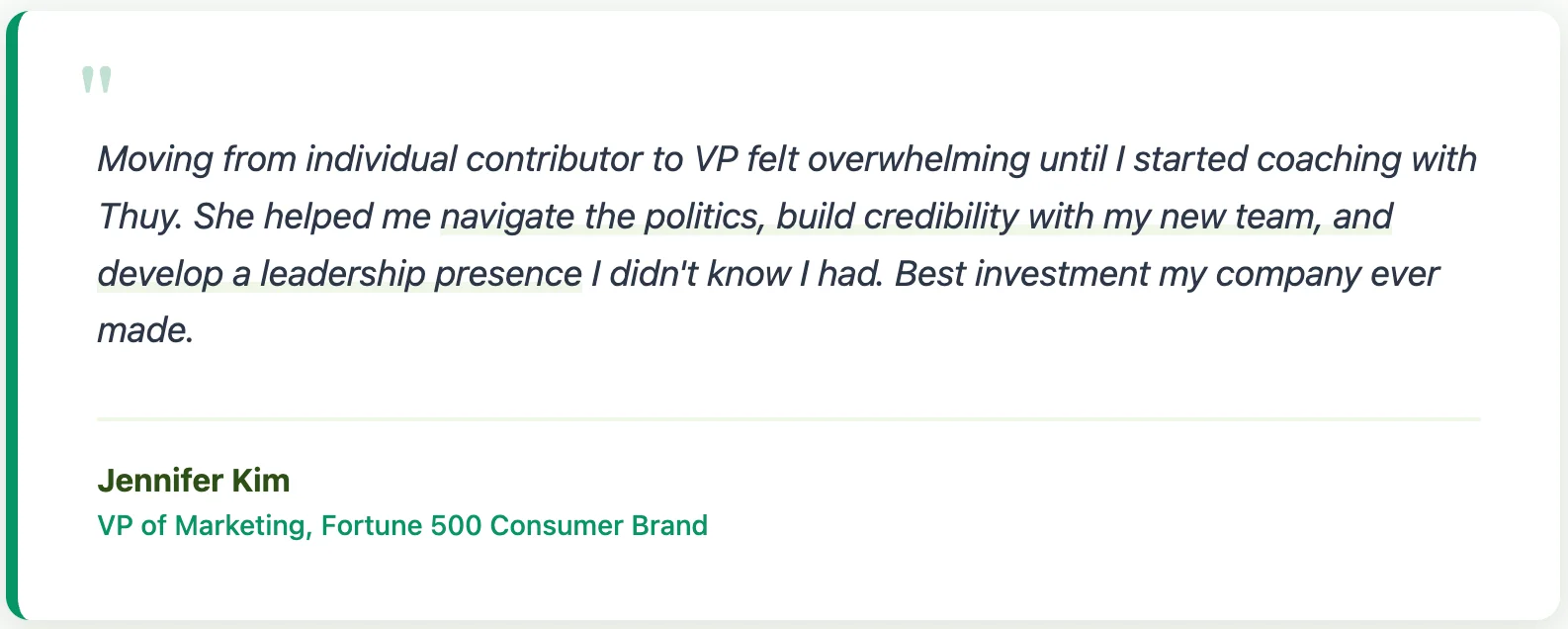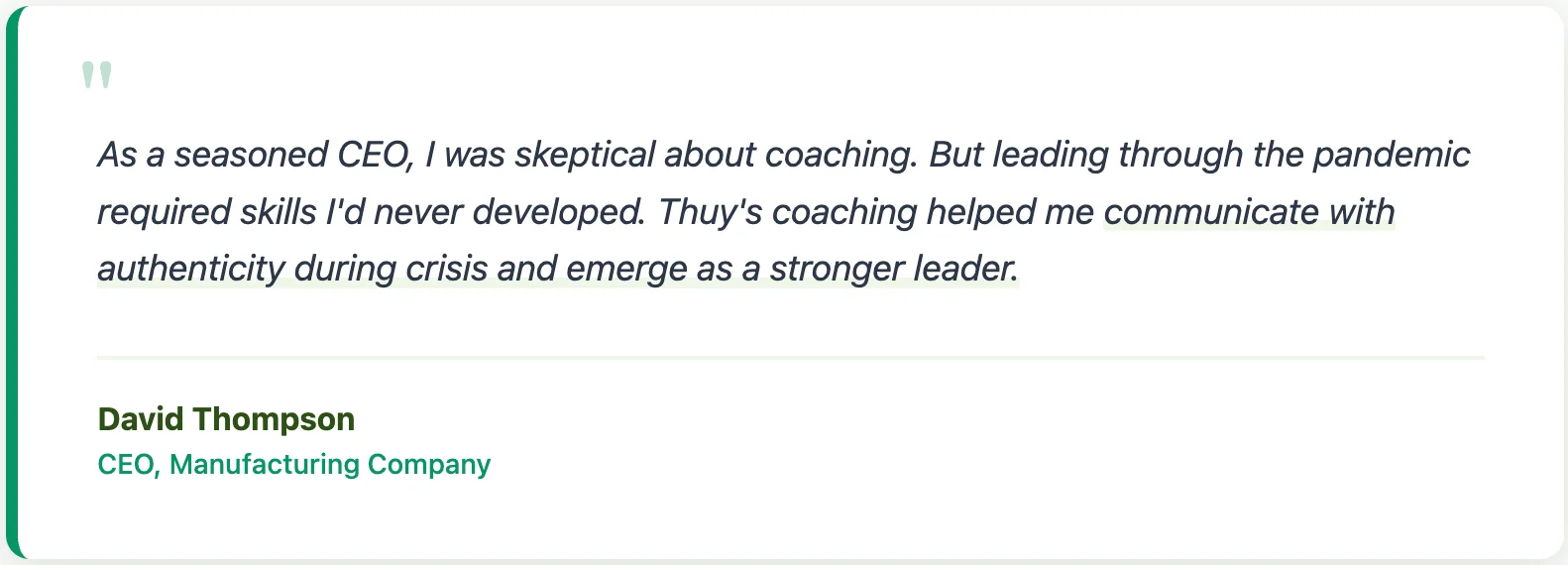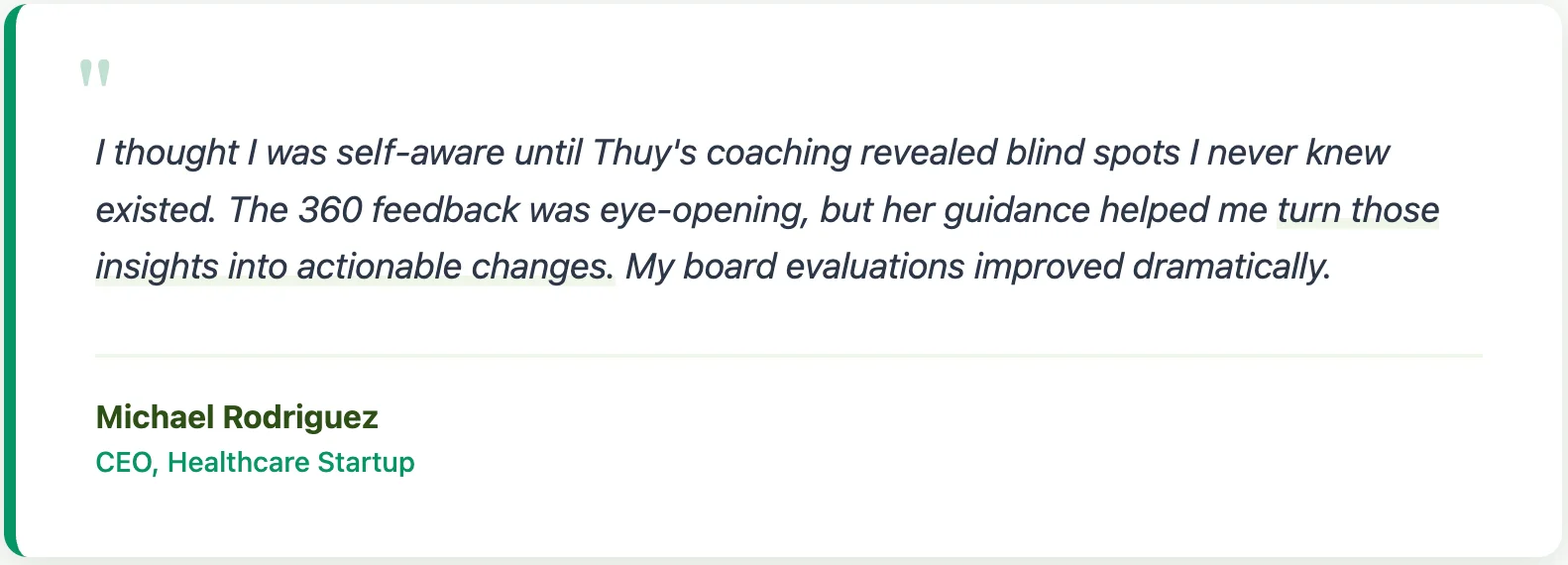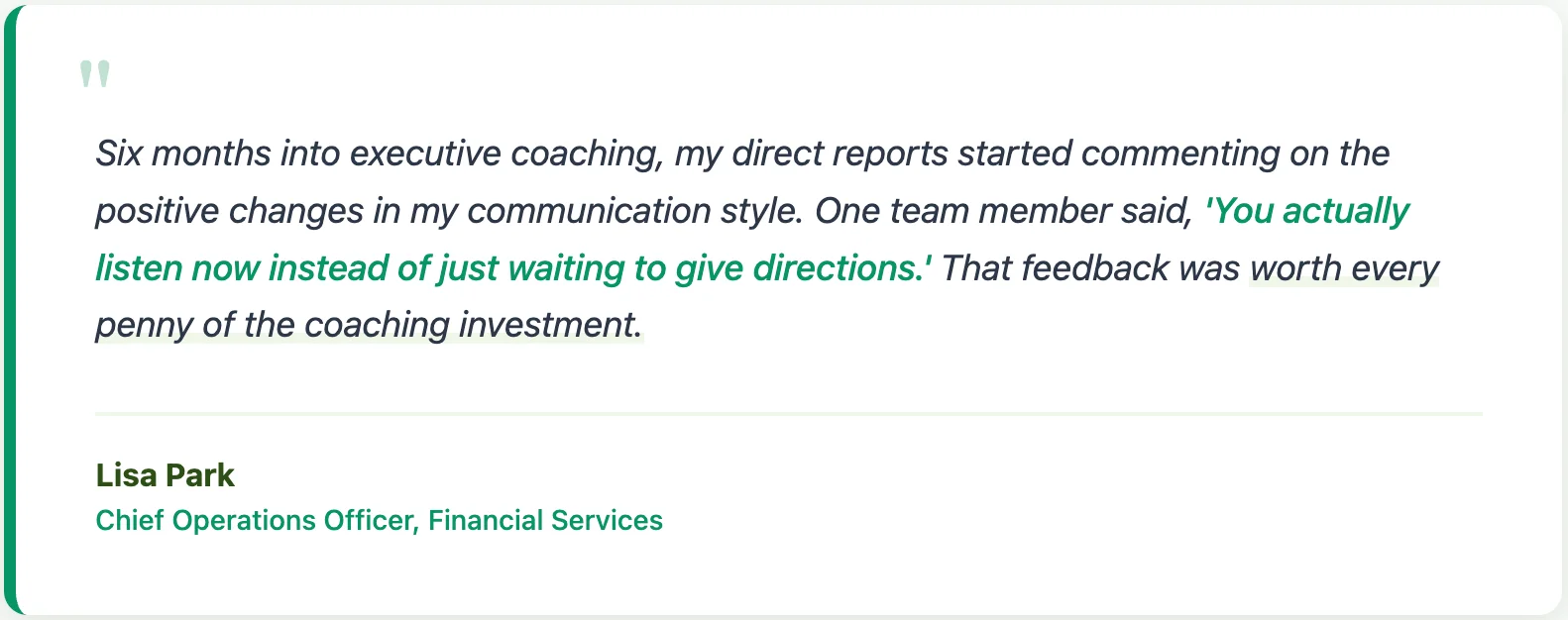The CEO’s Dilemma: Why Executive Isolation Is Your Biggest Strategic Risk
Feb 16, 2026
Today we're addressing a problem that gets whispered about in boardrooms but rarely confronted head-on: executive isolation. Are you feeling isolated?
Reviewed by Thuy Sindell, PhD. Written by Milo Sindell, MS.
Updated on October 1, 2025. Originally published on September 17, 2024
10 minute read
What is executive coaching? Your complete guide for 2025 (by a 27-year veteran coach)
Quick Answer
Executive coaching is a confidential, one-on-one professional development process that accelerates leadership effectiveness through structured conversations and skill-building exercises.
Who it’s for
Executive coaching is for high-potential employees preparing for leadership roles, Leaders transitioning into new positions or industries, seasoned executives facing unprecedented challenges, and leadership teams seeking better performance in alignment with organizational goals.
Duration
Executive coaching engagements typically last 6-12 months with bi-weekly sessions.
Expected ROI
The expected ROI of executive coaching is a 12-25% increase in team engagement and 15-30% improvement in retention rates.

After years of coaching executives, from startup CEOs to Fortune 5 C-suite leaders, I’ve learned that great leadership isn’t born, it’s built. In today’s rapidly evolving business world, even our most successful leaders require support to navigate new challenges.
I’ve coached leaders across every industry imaginable, from Apple and Google to Netflix and Uber, as well as biotech startups and entertainment giants. What I’ve found is that the fundamentals of good leadership remain the same, even as the business world continues to evolve.
Executive coaching is a confidential, one-on-one professional development process that accelerates leadership effectiveness through structured conversations and skill-building exercises.
In my experience building Skyline Group’s coaching practice (now managing over 180 coaches worldwide), I define executive coaching as distinct from other development approaches. It’s:
What makes coaching uniquely powerful? It meets leaders where they are, with their actual challenges, in real-time. When a CEO at a major tech company told me, “I need to figure out how to have difficult conversations with my board,” we didn’t talk theory. We practiced the exact conversation she needed to have the following week.
Through my doctoral research in organizational psychology and decades of coaching practice, I’ve identified that good executive coaching must address these key areas. We call it our competency-driven leadership development model:
These domains came from studying what separates high-performing leaders from their peers. In my book, “Hidden Strengths,” my co-author, Milo, and I detail how these competencies predict leadership success across various industries and organizational levels.

Understanding the specific benefits of executive coaching helps organizations identify the right candidates and set appropriate expectations for their investment.
Senior managers and emerging leaders identified for advancement require coaching to develop executive presence and strategic thinking prior to promotion.
Career Transitions Are Coaching Gold Mines. Leaders transitioning into unfamiliar territory—whether C-suite positions, international assignments, or cross-functional roles—benefit from targeted coaching during the critical first 90 days.

This might surprise you, but some of my most engaged clients are successful executives. Even experienced leaders with strong business acumen encounter situations outside their comfort zone where they need critical support: digital transformation, crisis management, organizational transformation initiatives, etc.

Group coaching can align leadership teams around shared goals while addressing individual leaders’ personal growth and development needs.
I’ll be direct here. Coaching isn’t always the solution. In my experience, executive coaching fails when:
I once had a potential client, a C-suite executive, who wanted coaching to “fix” their reputation after a public scandal. That’s not coaching. That’s crisis management. Coaching is effective when leaders are ready to grow, not when they’re seeking external validation or quick reputation repair.

This question comes up constantly. “Thuy, if someone’s already successful, why do they need coaching?”
Here’s what I tell them: Success can be its trap.
In my years of coaching, I’ve observed that successful leaders often face unique challenges:
I worked with a CEO who’d built her company through hands-on leadership and personal relationships. It worked brilliantly when they had 50 employees. At 500 employees? Her style was strangling growth. The behaviors that made her successful as a founder were limiting her ability as a scale-stage CEO.
Senior roles involve complex decisions with incomplete information. Through a confidential relationship, I serve as a trusted advisor and sounding board for leaders making decisions that impact thousands of employees and millions of dollars in revenue. Sometimes they need someone to ask, “What aren’t you considering?” or “How does this align with your stated values?”
The higher you climb, the less honest feedback you receive. External coaches fill this gap by providing unfiltered perspectives. I tell my clients: “Your direct reports aren’t going to tell you that your communication style is alienating the board.” That’s my job.
Great leaders multiply their impact by creating others. Through coaching, executives become better coaches themselves and create environments where leaders learn better. I’ve seen CEOs transform their entire organization’s culture by improving their coaching skills.
Through our Skyline 360 assessment tool, I’ve identified patterns in high-performer blind spots:
I had one client, a brilliant VP of Engineering, who couldn’t understand why his team seemed disengaged. Through 360 feedback, we discovered that his rapid-fire communication style and tendency to jump to solutions were making his team feel undervalued.
Six months later, his team engagement scores had improved by 40%.

Executive coaching is often confused with other professional development approaches. Here’s how it differs:

Research consistently shows emotional intelligence accounts for 58% of job performance across all industries³. For executives, this percentage climbs even higher. Executive coaching is uniquely positioned to develop emotional intelligence because of its personalized, real-time approach.
According to the Center for Creative Leadership, the primary causes of executive derailment are deficits in emotional competence, with the three primary ones being difficulty in handling change, inability to work well in a team, and poor interpersonal relations⁴.
Self-Awareness Development
Coaching cultivates increased self-awareness in leaders, enabling them to develop deep understanding of their emotional triggers and response patterns that derail performance.
Self-Regulation Under Pressure
Techniques like mindfulness, reframing, and stress management prevent impulsive decisions during crises.
Better Empathy
Role-playing and perspective-taking exercises improve leaders’ ability to connect with diverse team members.
Social Skills Mastery
Improving communication, conflict resolution, and strategic influence skills to become more sophisticated through coaching practice.

Brain research reveals the critical role coaches play in rewiring neural pathways:

The costs of executive coaching is one the most frequently asked questions I receive.
After building a global coaching practice, here’s what drives pricing. Executive coaching costs vary based on:
Executive coaching as a strategic investment. Like any bespoke service, pricing is commensurate with the level of service, the quality, and results.
Based on my experience, avoid coaches who:
Finding the right executive coach requires investment. I’ve seen too many organizations burned by cheap coaching that delivered no results. Investing in quality coaching is expensive. Poor coaching is even more costly when you factor in opportunity costs.
Yes, virtual coaching has proven highly successful, especially since the pandemic. Many executive coaches report that virtual sessions can be more focused and efficient than in-person meetings.
Look for specific behavior changes within 2-3 months, improvements in feedback from stakeholders, and progress toward the stated goals. If you’re not seeing measurable progress by month 4, reassess the coaching approach. You should work with a firm that can measure the impact and ROI of the investment.
Look for a skilled executive coach with relevant industry experience. Get professional referrals, web search, and interview at least three professional coaches and firms. Always interview multiple executive coaches and check references before making a decision - experience in your industry is an essential factor.

After many years in executive leadership coaching, I’ve learned that the best senior leaders never stop learning.
Executive coaching isn’t a sign of weakness. It’s a competitive advantage. Whether you’re a first-time manager or a seasoned CEO, the right coaching relationship can accelerate your impact and transform your leadership ability, and drive organizational success.
If you’re considering coaching for yourself or your organization, remember: it’s not about fixing what’s wrong. It’s about unleashing what’s possible.
Executive coaching isn’t about fixing weaknesses - it’s about unlocking your full potential as a leader.
Whether you’re a startup founder, an executive navigating challenges like team alignment and strategic transitions, or an HR professional developing your organization’s leaders, now is the time to invest in personalized growth that delivers immediate impact on leadership effectiveness and measurable ROI.
Let’s discuss your unique leadership goals and development opportunities - whether for yourself or your team - and discover how Skyline Group’s external perspective, proven methodology, and global network of 180 coaches can accelerate your success. With 20+ years of supporting clients and delivering success stories, our executive coaching services have helped Apple, Google, Netflix, Uber, and hundreds of other organizations achieve leadership excellence.
Book Your Complimentary 30-Minute Discovery Session Now or email us at [email protected]
¹ International Coach Federation (International Coaching Federation). “2020 ICF Global Coaching Study.” ICF, 2020. https://coachingfederation.org/research/global-coaching-study
² PwC. “Building Leadership Bench Strength: Planning for an Uncertain Future.” PwC, 2021.
https://www.pwc.com/jp/en/advisory/industry-fs/bcm/assets/pdf/future-leadership-development.pdf
https://www.strategyand.pwc.com/gx/en/insights/archive/global-talent-innovation/strategyand-global-talent-innovation.pdf
³ Bradberry, T. & Greaves, J. “Emotional Intelligence 2.0.” TalentSmart, 2009. https://www.talentsmarteq.com/products/emotional-intelligence-2.0/
⁴ Center for Creative Leadership. “The Lessons of Experience: How Successful Executives Develop on the Job.” Lexington Books, 1988.
https://shop.ccl.org/usa/the-lessons-of-experience-how-successful-executives-develop-on-the-job.html
https://www.ccl.org/articles/leading-effectively-articles/15-experiences-that-help-you-learn-to-lead/
⁵ Gallup. “State of the Global Workplace.” Gallup Press, 2022. https://www.gallup.com/workplace/349484/state-of-the-global-workplace.aspx

Founder and President
Executive Coaching Division
Thuy Sindell is the President of Skyline Group's Coaching Division, an executive coach, and author. Skyline's Coaching Division manages over 170 coaches, facilitators and consultants worldwide. Thuy's executive coaching experience spans over 20 years with companies across a number of different industries and sizes from technology to insurance and from start ups to Fortune 500s.

President
Coaching Scaled Division
Milo Sindell has over fifteen years as a business and human capital expert. He worked as a senior consultant for Intel and later at Sun Microsystems in areas including strategy development and implementation, change management, knowledge management, and leadership and employee development. At Skyline he is focused on market positioning and product development for Skyline's coaching technology solutions.
Feb 16, 2026
Today we're addressing a problem that gets whispered about in boardrooms but rarely confronted head-on: executive isolation. Are you feeling isolated?
Feb 3, 2026
Crossing the $1 billion threshold, whether in annual revenue, valuation, or market capitalization, is one of the most celebrated milestones in business. It validates years of founder vision, product-market fit, and relentless execution. But for the leaders who reach it, the celebration is short-lived. The operating model, decision-making habits, and leadership style that propelled the company from zero to $1B are suddenly insufficient for what comes next.
Jan 14, 2026
Discover how AI is reshaping executive coaching in 2026. Explore the top 5 leadership trends from agentic AI and human-AI collaboration to change fitness, ethical governance, & the irreplaceable human skills leaders need to thrive.
Jul 16, 2025
To be successful in the AI era leaders must master the human side of business. These 8 critical skills turn artificial intelligence from threat, to superpower.
Contact us today to get started